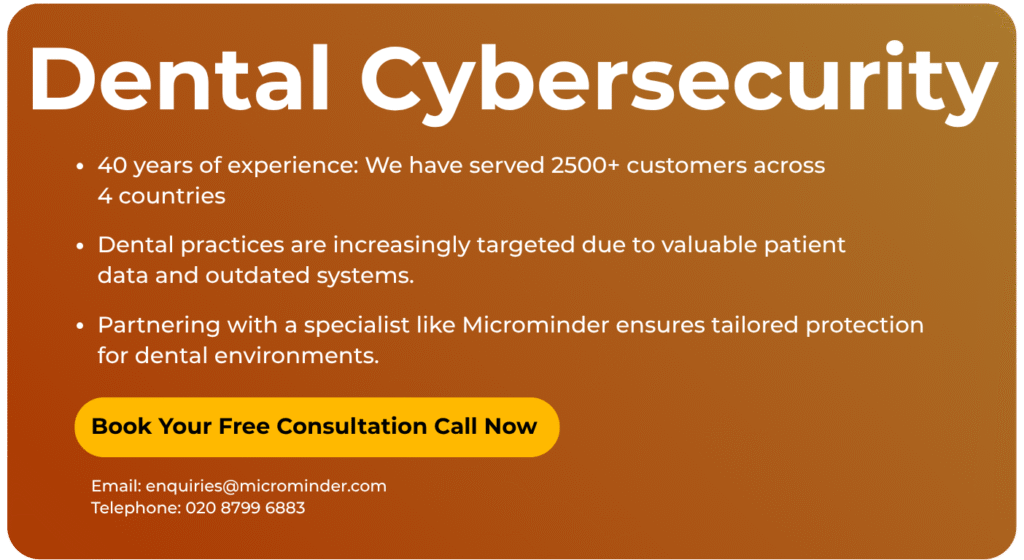Cyberattacks on dental practices are rising sharply. While 43% of UK businesses reported experiencing a cyber breach or attack in 2025, dental clinics face even greater risk due to the sensitive nature of patient data and often outdated systems. As practices increasingly adopt digital records, cloud-based patient data and remote access tools, they become lucrative targets for cybercriminals. The good news? With proactive cybersecurity solutions from Microminder, dental practices can safeguard sensitive data, maintain patient trust and avoid costly downtime or penalties.
Dental practices are increasingly targeted by cybercriminals due to the high value of patient data and the prevalence of outdated systems. Patient records often contain a combination of medical history, financial details, and personal identifiers, all of which can be sold on the dark web. Many clinics also operate with limited IT support, which are highly sought after by attackers, making them more susceptible to breaches.
Dental clinics face a range of cyber threats, including:
These threats are not hypothetical, they’re happening regularly across the UK, with some practices facing recovery costs exceeding £35,000, including fines, remediation, and reputational damage.
To protect against these threats, dental practices must adopt a proactive approach to cybersecurity. This includes:
These measures not only reduce risk but also demonstrate a commitment to patient safety and regulatory compliance.
Remote access tools are increasingly used in dental practices to enable flexible working and access to digital records. While convenient, these tools can introduce serious vulnerabilities if not properly secured:
Microminder’s cybersecurity solutions include secure remote access configurations, multi-factor authentication, and continuous monitoring — ensuring that off-site connectivity doesn’t become a backdoor for attackers.
The consequences of a breach extend far beyond IT recovery. Practices may face:
In many cases, the total cost of a breach, including fines, remediation and lost revenue can exceed £35,000. Prevention is not just preferable – it’s best practice.
With over 40 years of experience and 2,500+ clients across the UK and Ireland, Microminder is the UK’s leading cybersecurity partner for dental and healthcare practices. We offer:
And so much more!
📞 Book Your Free Consultation Call Now
📧 Email: enquiries@microminder.com
📱 Telephone: 020 8799 6883

Most off-the-shelf dental software lacks advanced security features. A cybersecurity audit can reveal gaps and suggest improvements.
Start with a Penetration Test and staff training around cyber awareness. These two steps address the most common vulnerabilities.
Yes — Microminder offers scalable solutions tailored to your needs and budget.